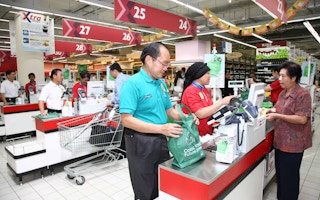For a population of five million people, Singapore uses a staggering amount of three billion plastic bags a year, a new study by the Singapore Environment Council (SEC) has found.
To tackle this huge amount of wastage, the environmental non-profit has recommended that the government implement a nationwide “Bring Your Own Bag Everyday” programme to be mandated in all commercial and retail establishments.
“Retailers should stand firm in their resolve to have cashiers ask if customers really need plastic bags,” SEC said in the study. And despite potential customer objections, they should charge an additional fee per plastic bag use on weekends.
In an effort to reduce the country’s plastic waste, the SEC recently conducted a survey of 2,500 Singaporeans and permanent residents aged 15 years old and above from various households to gauge the country’s consumer behaviour and attitudes on plastic and reusable bags.
They concluded that there are disparate views on the issue stemming from economic to personal interests, and coming up with viable solutions requires all sectors of society – the government, retailers, and the public – to engage in a national discourse, especially on developing greener mind-sets and behaviour.
“
The findings in this paper have shown that the usage of plastic bags in Singapore is a complex and multi-faceted issue for which there is no simple solution. Economic considerations have to be balanced with environmental and commercial and even personal interests
Jose Raymond, SEC executive director
Currently, about 33 per cent of the polled respondents indicated that they “waste all or some of the plastic bags given out for free at supermarkets”, said the SEC.
However, in another survey question, 90 per cent indicated that their plastic bags were reused to dispose of general waste, although “some households are storing quantities of plastic bags in excess of what they need for waste disposal,” the Council pointed out.
Another reason shoppers may opt to use plastic bags is because of impromptu or unplanned shopping trips, the survey revealed. And the top reason is simply because plastic bags are free in supermarkets.
“The findings in this paper have shown that the usage of plastic bags in Singapore is a complex and multi-faceted issue for which there is no simple solution. Economic considerations have to be balanced with environmental and commercial and even personal interests,” said SEC executive director Jose Raymond.
This is why the survey reached out to a diverse group, explained Vaidehi Hemant Shah, the principal project researcher. “So that the results would be representative of what was the ground sentiment, and also to understand the problems from as many angles as possible,” she added.
“The recommendations shared in this position paper form the catalyst for definitive action by individuals, retailers and the government,” Raymond said.
Other recommendations listed in their document include rethinking current waste management infrastructure such as the convenience of trash chutes in every household; rebates for dining customers who reject small bags and disposable plates and cutlery in hawker stalls, coffee shops and food courts; ensuring plastic waste reduction starts at an early age with a “no-waste toolkit” for school children; and more initiatives that eliminate the use of bags with minimal or zero potential for secondary usage like food bags in hawker stalls or convenience stores.
According to the SEC, one respondent remarked on the excessive use of plastic bags at bakeries, where breads and pastries are individually wrapped.
These findings underscore the need to have greater public awareness on plastic bag use and waste, and the need to reassess the waste collection infrastructure while addressing public hygiene concerns.
“All the recommendations put forth in this position paper would require a concerted effort from stakeholders such as the government, retailers, academic organisations, environment specialists and the public,” said Raymond.
The Council urges collaboration from all stakeholders to reduce plastic pollution in Singapore and they plan to start an outreach and education campaign in 2014.

















